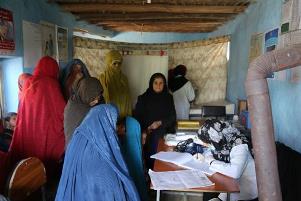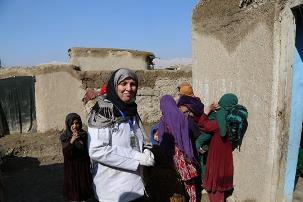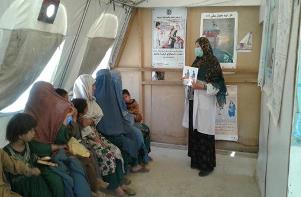 Afghan women at a mobile clinic in an IDP camp in Kabul. Photo: WHO/S.RamoKabul 12 June 2017 – A razor blade, plastic sheet, bar of soap and a piece of clean string. These are the only items inside a tiny clean delivery kit that Kawkaba, 45, uses when she delivers babies in a camp for internally displaced persons (IDPs) in the outskirts of Kabul.
Afghan women at a mobile clinic in an IDP camp in Kabul. Photo: WHO/S.RamoKabul 12 June 2017 – A razor blade, plastic sheet, bar of soap and a piece of clean string. These are the only items inside a tiny clean delivery kit that Kawkaba, 45, uses when she delivers babies in a camp for internally displaced persons (IDPs) in the outskirts of Kabul.
Kawkaba has been a midwife for 21 years and has spent the past five years providing essential health services to women at a WHO-supported mobile clinic operated by SHRDO NGO at the Pul-e-Company camp for IDPs in Kabul.
The Pul-e-Company IDP camp is home to almost 6000 Afghans, most of whom have fled conflict from volatile provinces such as Helmand and Kunduz and now survive on only a few dollars a day. Many have lived in the camp for years, in basic conditions without running water, proper sanitation facilities or electricity.
 Midwife Kawkaba enters the mobile clinic in Pul-e-Company IDP camp. Photo: WHO/S.RamoSince December 2016, WHO has supported the operation of mobile clinics in 17 IDP camps in Kabul for over 41 000 Afghans, including over 16 000 women and over 8200 children under the age of 5. Running the mobile clinics through six teams has been made possible by generous funding received from USAID, the European Civil Protection and Humanitarian Aid Operations (ECHO) and the Common Humanitarian Fund (CHF). Between December 2016 and April 2017, the mobile clinics handled over 31 000 out-patient visits and over 1200 ante-natal care visits, and the teams vaccinated more than 600 children against measles.
Midwife Kawkaba enters the mobile clinic in Pul-e-Company IDP camp. Photo: WHO/S.RamoSince December 2016, WHO has supported the operation of mobile clinics in 17 IDP camps in Kabul for over 41 000 Afghans, including over 16 000 women and over 8200 children under the age of 5. Running the mobile clinics through six teams has been made possible by generous funding received from USAID, the European Civil Protection and Humanitarian Aid Operations (ECHO) and the Common Humanitarian Fund (CHF). Between December 2016 and April 2017, the mobile clinics handled over 31 000 out-patient visits and over 1200 ante-natal care visits, and the teams vaccinated more than 600 children against measles.
As conflict escalates in many parts of Afghanistan, the number of IDPs in need of assistance soars. Since the beginning of the year, over 103 000 Afghans fled their homes due to conflict and 29 out of 34 provinces have some level of forced displacement. Last year over 665 000 Afghans were internally displaced by conflict; a 40% increase from 2015.
Healthcare through mobile services
People living in the camps rely on the WHO-supported mobile clinics for basic health services. “We get good quality medicines and health services here for free. This clinic is very important for all of us here,” said Hamid, one of the residents at the Pul-e-Company camp.
“The clinic helps us a lot as we can get all the basic healthcare we need for free here,” said Mir Alam who fled the conflict in Helmand province 8 years ago and now lives in Kabul’s Charahi Qambar IDP camp with his 8 children.
 Midwife Kawkaba sees a patient at the Pul-e-Company IDP camp. Photo: WHO/S.RamoEach mobile clinic is staffed by a medical doctor, vaccinator and two midwives. Afghans living in the camps rely on the clinic for all basic health needs, such as vaccinations, nutrition counseling, family planning services, health education, and ante- and postnatal care.
Midwife Kawkaba sees a patient at the Pul-e-Company IDP camp. Photo: WHO/S.RamoEach mobile clinic is staffed by a medical doctor, vaccinator and two midwives. Afghans living in the camps rely on the clinic for all basic health needs, such as vaccinations, nutrition counseling, family planning services, health education, and ante- and postnatal care.
“On average we get around 70 patients a day. The majority are women as they come for pregnancy-related visits, family planning and vaccinations for their children,” said Dr Saleh, a medical doctor at the Pul-e-Company camp.
Acute respiratory infections and pneumonia are major health problems affecting children in the camps in the winter whereas the hot summer months bring a sharp increase of acute watery diarrhoea cases.
“Before we had a mobile clinic here, I remember that in this camp alone, more than a hundred children died one winter due to respiratory infections that could have been easily prevented with basic health services,” said Dr Faizy who manages all the SHRDO mobile clinics in Kabul.
To ensure access to referral services, all clinics have an ambulance on site. Outside of the clinics’ operational hours, SHRDO has made arrangements for alternative transportation from the camps to nearby hospitals, especially for emergency obstetric and paediatric cases.
Saving the lives of mothers and babies
Women living in the camps rely on the clinics for essential health checkups and assistance. Due to cultural sensitivities, many women cannot leave the camps to deliver their babies in one of Kabul’s public hospitals that are located far way. Many women still give birth in their homes assembled together of mud and plastic sheets, in basic conditions, without electricity or running water. Midwives working in the camps assist deliveries in women’s homes.
“I am happy when I am able to help women and when they are happy with the care that I provide for them,” midwife Kawkaba says. “I assist with around three deliveries every month in women’s homes in the camp. If there is no midwife in the camp, we give these clean delivery kits to families and teach them how to use them so they can have a safer birth at home.”
In the past four months, the teams have distributed 200 clean delivery kits to IDPs.
 Health education sessions are a key component of SHRDO’s work in the IDP camps. Photo: SHRDOFive years ago most women living in the Pul-e-Company camp would not go to a hospital to deliver their baby in the presence of a skilled birth attendant. Now, according to Kawkaba, around half of the women deliver in the hospital, the rest inside the camp in basic conditions.
Health education sessions are a key component of SHRDO’s work in the IDP camps. Photo: SHRDOFive years ago most women living in the Pul-e-Company camp would not go to a hospital to deliver their baby in the presence of a skilled birth attendant. Now, according to Kawkaba, around half of the women deliver in the hospital, the rest inside the camp in basic conditions.
Increasing the number of women delivering in the hospital has not been easy but has taken years of painstaking work by Kawkaba and her colleagues.
“We often bring the husbands here to the clinic to educate them about the risks associated with childbirth. We explain to them that there are female midwives available in the hospital to encourage them to have their wives deliver their babies there,” Kawkaba says.
The mobile health teams organize health education sessions with IDPs three times a week to discuss issues such as hygiene, sanitation, family planning, nutrition, breastfeeding and the importance of vaccination. Every week, the teams also deliver health education by going from door to door with the support of the camps’ shuras, community groups.
“Health aducation is one of the most important parts of our work in these clinics. Without our consistent outreach to communities, we wouldn’t have these levels of success in getting people to seek health services and get treatment here,” said Dr Faizy from SHRDO.
These SHRDO-run mobile clinics were forced to close in May 2017 due to the closure of the current funding mechanism and no further funding being available to sustain the operations. The Ministry of Public Health, with the support of WHO, is currently looking into alternative ways of supporting essential health services for the tens of thousands of Afghans living in these camps.
Mobile clinics in 17 IDP camps in Kabul were supported by generous donations from USAID, ECHO and CHF between December 2016 and April 2017.
WHO Afghanistan Emergency and Humanitarian Action Updates


